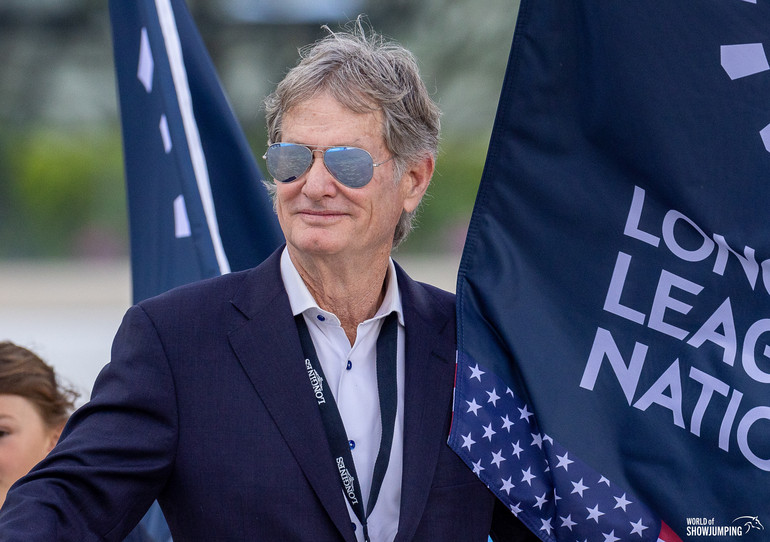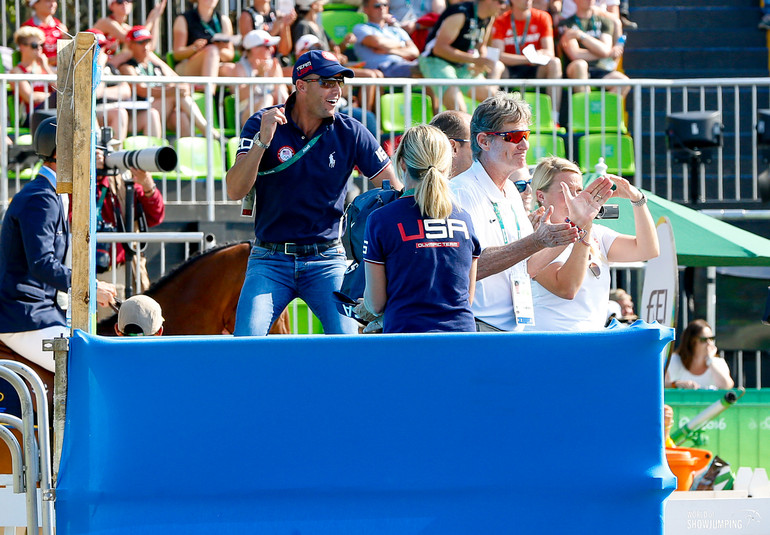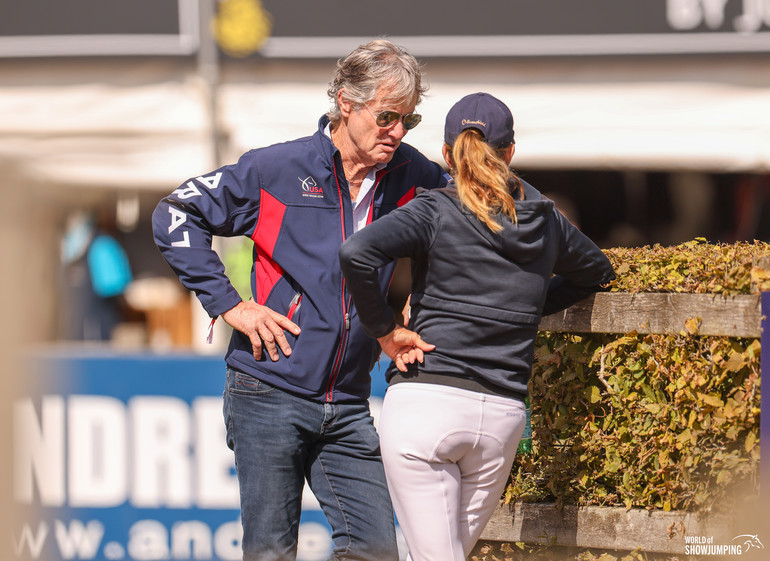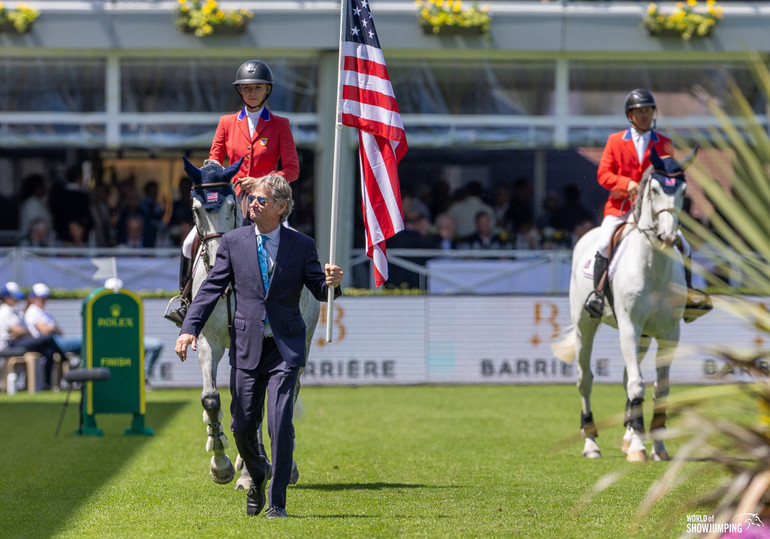Text © World of Showjumping
“We are in the middle of the final stages of our selection and preparation process for the team,” Robert Ridland, the chef d’equipe for the US jumping squad, tells World of Showjumping six weeks prior to the 2024 Olympic Games in Paris. “We're in the midst of these Nations Cups of Rome, St Gallen and La Baule, and we have Rotterdam coming up. After Rotterdam, we are literally right in the final stages, both in terms of selection as well as preparation. And those two go hand in hand; there are some riders where these shows work more on the selection side, and for others, more as preparation.”
“In the end, you obviously want to have the best team, but they also have to have current form and of course the body of work is a main element of our selection. The selection system we have in our country is objectively based. However, it's not exclusively objective, otherwise you just count points and we don't do that. Our system is based fundamentally on an objective evaluation and then incorporating the body of work and recency of results to the mix. Going into this final stage, we are in a pretty good situation compared to some of the previous championships. Now we have quite a good balance of our veterans and the next generation. I think we are in a good situation, even though that is not going to make it an easy decision.”
Tough balancing act for any country
For Ridland, who has been in his role for the past twelve years and has coached the American team through the Rio and Tokyo Olympics, Paris will be his third Games as chef d’equipe. On both prior occasions, the US team returned home with a team silver medal. Throughout the years, Ridland’s number one objective has been making sure that the next generation of riders gets an opportunity to grow alongside the seasoned veterans. “When I first started, that was probably my number one priority; making sure that there was a balance between our top professional riders – who obviously have been to many championships and come away with medals – and the next generation of riders,” he explains.
Over the years, I have tried to balance out the teams so that there is experience with the younger generation
“It's a tough balancing act for any country, to make sure that your top performers don't squeeze out the opportunities for the next generation. Over the years, I have tried to balance out the teams so that there is experience with the younger generation. I have called it the three-two-system where you would, in an ideal situation, have three veterans combined with two of the newer riders. This way, the up-and-coming riders can gain experience from competing with the top professionals. It's very important for us, even though it cannot always be the case. And obviously, when you go to a championship, you take your best four. However, in the Nations Cups – which I believe are the bedrock of our sport – we really try to keep our focus on the next generation.”
“In these last years, we have been on the podium at every championship with the exception of the World Championships in Herning,” Ridland continues to explain about the qualifying process towards the 2024 Olympic Games. “Not being on the podium in Herning created a situation where we had to qualify through the Pan American Games, and everybody keeps pointing out how late it was. However, the reason it was so late was because the Pan American Games being in the southern hemisphere are held in November instead of July. So, we weren't actually any different from other teams around the world that had to qualify in the summer, even if it seemed like it was late. In many ways, I used the Pan American Games as the beginning of the selection and preparation for Paris. It was almost a dress rehearsal in some ways, because it was only six months out from Paris and some horse-and-rider combinations are a part of the process that we have going on right now.”
You can’t throw away a mistake
“I think Nations Cups really are the bedrock of our sport,” Ridland highlights. “Our riders have less opportunities to compete with teammates because most of the time, they're competing as individuals. I think we all wanted to see how the new Longines League of Nations worked out, and, so far, I would say that the new format is working very well. Four riders in the first round going down to three riders without a discard score in the second round is, for starters, a good preparation for the Olympic Games where you have a similar format. Additionally, from the point of view of promotion of the sport and the support of the general public, it is easy to follow. I was one of the few in the very beginning that felt that the change of the Olympic format was going to be a good thing. I think that it's much more understandable now, and more similar to other sports where you can't just throw away a mistake. As an example, when you've got the 4 x 100 meter final and one of the runners drops the baton, you're out, you don't get another chance of doing it again. In golf, if you hit the ball in the water, it's in the water; you don't get to say, ‘well, I won't count that shot’. In my opinion, starting the final round of the team competition at the Olympic Games on zero and having no discard score is much more understandable for the general public. Basically, it's a running total and you can just look up at the scoreboard and see where everybody is.”
I was one of the few in the very beginning that felt that the change of the Olympic format was going to be a good thing
“However, the new format does add a new element to the sport and it even affects the selection process to the team,” Ridland continues. “Now you are very much concerned about a rider’s ability not to have a big score as opposed to their ability to be jumping a clear. When you have a discard score situation, you're generally not going to be winning on four fault rounds, you need to be jumping clears. Now, you in particular want to avoid the big score because that can change things, as we saw in the Tokyo Olympics radically at the last minute. I'm in favor of that and the Longines League of Nations has brought that into the regular Nations Cup series.”
“However, in general, I am a big fan of the Nations Cup-shows at the highest level. I think the traditional Nations Cup venues have done a fantastic job, whether we are talking about Dublin, Aachen, Spruce Meadows or La Baule. These great Nations Cup shows are still the pillars of our sport.”
The good old days weren't necessarily good
Ridland himself first rode on the US team when he was 19 years old, in La Baule. Prior to the last twelve years as the US chef d’equipe, he has worked as a FEI course designer, a color commentator for NBC at two Olympics, as well as a horse show organizer – including the World Cup Finals in Las Vegas. “I've seen the sport change,” he says. “The courses have changed, the type of horses that we use have changed and obviously the number of competitions has changed. The way I see it, it's not for better or for worse; the good old days weren't necessarily good, but there were some really great parts to the sport back then. The courses have changed radically, back then the bravery aspect of a horse was much more substantial. Now the courses are lighter, we have safety cups…”
While the sport has changed completely, the fundamentals have not: Good horsemanship is still good horsemanship
“While the sport has changed completely, the fundamentals have not: Good horsemanship is still good horsemanship,” Ridland points out. “The fundamentals of the sport are the same and it's the same beautiful sport that it has always been. If you look at the top riders in the world, they're doing the fundamentals right and they are great athletes – and that was how it was 40 years ago as well.”
“What has really changed for us is that back when I first started, you didn't ride for owners when you were riding on the team,” Ridland continues. “You rode for the team and the owners would either loan or donate their horses to the US equestrian team. If you were selected as a rider, the US federation would determine what horse you rode. Everything changed before the 1976 Olympics in Montreal, where we had a much younger group of riders – we were all in our twenties – and we all rode for owners. It was really the interjection of professional riders into the US team. I think that was the biggest change in the team because now the riders would be selected as they are, with their string of horses.”
Nations Cups should be the priority
“I don’t think the sport needs a major change in directions,” Ridland says about the future. “I think the priorities should stay where they are. Many people are worried about the Nations Cups having less of an impact in the sport, but I think that's not the case. I think the traditional CSIO five-star shows are only getting stronger. We've seen huge crowds in La Baule and Rome and as long as these traditional shows stay alive and well, I think our sport is on the right track. The FEI has said many times that their priority is to make sure that the Nations Cups got stronger, and that is why they created the Longines League of Nations. We weren't sure if the League was going to be successful in that regard, but I would say so far it seems to work. Forgetting the unfortunate rain that happened in St Gallen, the first two qualifiers in Abu Dhabi and Ocala were tremendously successful and I'm sure Rotterdam will be the same. The top riders have agreed that the Nations Cups should be the priority. As long as that is maintained, I think our sport is going in the right direction.”
I don’t think the sport needs a major change in directions
“I truly love the sport,” Ridland says about his own motives. “I probably get more gratification and enjoyment in the heat of the moment now than I did riding on the team myself. The professional athletes that are on the US team and those that we compete against, they are a community of athletes at the highest level and having the privilege of being a part of it, in the heat of the battle, and after the battle, that brings me the most joy.”
18.6.2024 No reproduction of any of the content in this article will be accepted without a written permission, all rights reserved © World of Showjumping.com. If copyright violations occur, a penalty fee will apply.













